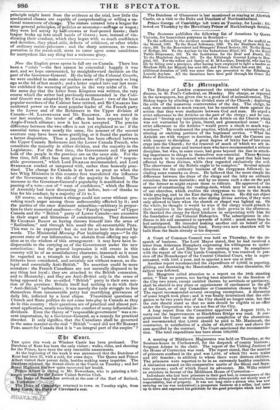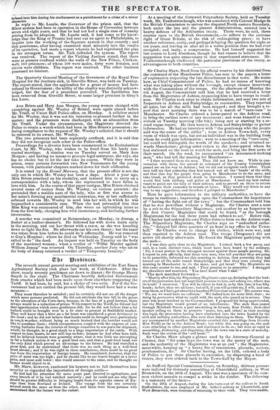liattrOPOii%.
The Bishop of London commenced the triennial visitation of his diocese, in St. Paul's Cathedral, on Monday. His charge, as reported in the newspapers, has given rise to a good deal of animadversion. The Bishop began by alluding to the divided state of the Church ; deploring the evils of the numerous controversies of the day. The clergy, he said, were entitled to much respect, but he cautioned them against the notion that they were mediators between God and man. He urged a strict adherence to the Articles on the part of the clergy ; and he con- demned "forcing any interpretation of an Article on the Church which was not warranted by its plain, literal, and grammatical sense " : the strict adherence to the Articles " would prove a check to much way- wardness." He condemned the practice, which prevails extensively, of altering or omitting portions of the baptismal service. "'What the Articles are with respect to doctrine, the Rubric and the Canons are with respect to discipline. A great degree of laxity has of late years crept into the Church ; for the removal of much of which we are in- debted to those pious and learned men who have recommended a stricter discipline, but who, in some cases, had gone beyond the line in attach- ing importance to things in themselves non-essential. Those tersons were much to be condemned who overlooked the good that had been effected by those divines, while they regarded exclusively the evil. The observance of the Rubric ought to be complete." Several minute directions for the ordinary business of the clergyman followed; in- cluding some remarks on dress. He believed that the more simple the difference between the dress of the clergy and the laity on ordinary occasions, the more desirable; and by no means such a one on the part of the former as might expose them to ridicule. He approved of the manner of constructing the reading-desk, which may be seen in some of our churches, which enables the clergyman to turn to the South while praying, and to the East during the Lessons. He did not object to candles being placed on the altar during divine service, if they were only allowed to burn when the church or chapel was lighted up. On the whole, he thought it would be wise if the clergy would preach in their surplices in the morning, and in their gowns in the afternoon. He thanked the clergy for their kindness in cooperating with him for the foundation of the Colonial Bishoprics. The subscriptions in obe- dience to his call amounted to upwards of 8,0001.; much more than be had anticipated. He intended making another call on behalf of the Metropolitan Church-building fund. Forty-two new churches will be built from the funds already at his disposal.
A Court of Common Council was held on Thursday, for the de- spatch of business. The Lord Mayor stated, that he had received a letter from Alderman Humphery expressing his willingness to under- take the office of Lord Mayor for the ensuing year. In compliance with the report of the City Lands Committee, it was resolved to pen- sion of' the Housekeeper of the Central Criminal Court, who is super- annuated, with 100/. a year, and to appoint a new one at 2001. Another report recommended the expenditure of 3,0001. in papering, gilding, and decorating the Mansionhouse. After some discussion, the subject was deferred. Mr. Musgrove called attention to a report on the 26th standing order, "That no person, not having been admitted to the freedom of the City two years, except entitled thereto by servitude or patrimony, shall be elected to any place or appointment of emolument in the gift of the Court, or of any Committee or Commission chosen by them." The report recommended several sweeping exemptions. A discussion of some length took place ; and it was finally determined that the obli- gation to be two years free of the City should no longer exist, but that the rule should stand so that no man should be eligible to an office under the Corporation who was not free of the City.
A long report from the Committee appointed in August 1833, to carry out the improvements at Blackfriars Bridge was read. It con- gratulated the Court on the successful completion of the alterations, and recommended that 5,0001. should be paid to Mr. Macintosh, the contractor, in satisfaction of a claim of 46,000/. over and above the sum specified by the contract. The Court sanctioned the recommenda- tion. The total expenditure has been about 100,0001.
A meeting of Middlesex Magistrates was held on Thursday, at the Sessions-house in Clerkenwell, for the despatch of county business ; Sergeant Adams in the chair. The report of the Visiting Justices of the House of Correction was read. The report stated, that the number of prisoners confined in the gaol was 1,058, of which 761 were males and 297 females ; in addition to whom there were thirteen children. The prisoners were reported to be in an extremely healthy condition. A discussion ensued on the comparative merits of the Silent and Sepa- rate systems ; each of which found its advocates. Mr. Wilks related an anecdote in favour of the Middlesex House of Correction— Individuals who had been prisoners in their gaol had, in consequence of the instructions they had received therein, become subsequently not merely men of respectability, but of property. It was not long since a person who was now carrying on (as was understood) a prosperous business as a miller, had come up to town and expressed his gratitude for the good principles which bad been
infused into him daring his confinement as a punishment for a crime of a minor character. In reply to Mr. Laurie, the Governor of the prison said, that the Silent system had been in operation in the House of Correction between seven and eight years, and that he bad not had a single case of insanity arising from its adoption. Mr. Laurie said, it had come to his know- ledge that the King of Prussia had sent out an agent to Philadelphia, to inquire into the working of the Separate system in that country ; and that gentleman, after having examined most minutely into the results of its operation, had made a report wherein he had reprobated the plan in the strongest terms. Mr. Talk defended the system. The report was received. The report of the Visiting Justices stated, that there were at present confined within the walls of the New Prison, Clerken- well, 160 prisoners ; of whom 109 were males, forty were females, and eleven were children. The report was received. The other business possessed no interest.
The Quarterly General Meeting of the Governors of the ,Royal Free Hospital for the destitute sick, in Greville Street, was held on Tuesday. The report stated, that the application for a grant of money had been refused by Government : the utility of the charity was distinctly acknow- ledged, but the fear of a precedent prevailed. The Institution has been removed from Greville Street, to some larger premises in Gray's Inn Lane.
Ann Briers and Mary Ann Morgan, the young women charged with conspiring against Mr. Wooley of Bristol. were again placed before Mr. Traill, at Union Hall Police-office, on Monday. A solicitor stated for Mr. Wooley, that it was not his intention to proceed further in the matter; and the prisoners were discharged, with an admonition from Mr. Trail!. Under the circumstances, the Magistrate directed the Police to retain a watch which had been in Miss Briers's possession ; re- fusing compliance to the request of Mr. Wooley's solicitor, that it should be restored to its owner, Mr. Wooley. The two prisoners had been separately confined, and it is said that they did not recognize each other at the Police-office. Proceedings for a divorce have been commenced in the Ecclesiastical Court, by Mr. Wooley, who wishes to be freed from his lately con- tracted marriage. A citation was on Tuesday served on Mary Ann Morgan ; and having no means to procure legal assistance, she says, she has no choice bat to let the law take its course. While they were in prison, some persons forwarded two New Testaments for the young women, with particular chapters marked down for their edification.
It is stated by the Bristol Mercury, that the present affair is not the only one in which Mr. Wooley has been a dupe. About a year ago, Miss Briers practised on his credulity, and induced him to carry on a correspondence with a lady, whom she represented to have fallen in love with him. In the course of that paper intrigue, Miss Briers obtained several sums of money from Mr. Wooley, on various pretexts : she pretended that a maiden aunt of the lady, who at first was averse to her neice's forming any matrimonial connexion, was at last sufficiently softened towards Mr. Wooley to send him her will, in which he was bequeathed a considerable sum. When she had persuaded him that Miss King was enamoured of him, she wrote an upbraiding letter as from the first lady, charging him with inconstancy, and declining further intercourse.
A murder was committed at Bermondsey, on Monday, by Jessup, a flesher at a leather-dresser's. He followed his wife down stairs early in the morning, and cut her throat with a razor, as she was kneeling down to light the fire. He afterwards cut his own throat ; but the razor was taken from him before he could do it effectually. He was removed to Guy's Hospital ; where he died on Wednesday. Jessup said he "was called to do" the deed. An inquest was held on Tuesday on the body of the murdered woman ; when a verdict of "Wilful Murder against William Jessup" was returned On Thursday, another Jury who sat on the body of Jessup returned a verdict of" Temporary Insanity."



























 Previous page
Previous page